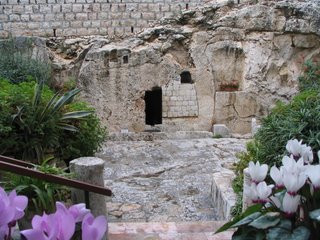
This truth that follows from the father is a truth that is fulfilling; it is a truth so focused on the cleansing of a people of dirt; it is a truth of universals; it is a truth of who we are in Christ; it is a truth eternal:
Recently, a friend of mine, whose talent until this point I had only known in rumor, came to a talent show and displayed a couple of the paintings she had done. In one of these pictures, she had beautifully displayed a still life of jars which were set on a table covered in white linen. Each was on a different tier of the table, and each had its own characteristic in the makeup of the perspective of the painting. One in particular I found to be of an interesting stature as it was the one jar, in a seeming array of colored pots, which was found to be whiter, blander, less decadent than the rest. This struck me to be a crazy contrast with the rest of the painting, and more still when she described the theme of the painting, which escapes me at the present, I found that I related to it in a deeper and more spiritual manner in that it seemed that this jar seemed to encompass, in its aesthetic aura, an exegetical commentary on the condition of a multitude of aspects of the life of the jar and subsequently our own.
German Philosopher Martin Heidegger, in his essay “The Thing,” actually finds in his own way a similar commentary when thinking more generally of the mere thing “a jar.” It is here that Heidegger finds the thing, and to be sure all things, to encompass in their very existence the culmination, or gathering as he puts it, of the four main things, those being earth, sky, divinities, and mortals. It is here, in the thing (Das Ding), and namely in the example of the jar as he gives in “The Thing,” that one is to find the meeting place of the dream and the reality; it is the common ground of the divine and the mortal. This, of course, is a seemingly mystical spin on what seems to be merely the application of philosophy; here Heidegger finds truth in the aesthetic existence and applicability of the thing rather than the philosophical. In this one can see that the jar, used as a sacred tool and as a mere watering vessel, finds itself in the common ground of that which is divine and that which is mundane. So too, as I pondered on it, did I find similarities in Heidegger’s discussion of the jar as the gathering of the four fold and with my friend’s painting. I began to think of the jars as they stood in existence as jars on that white and sterile environment of linen. I began to think that they were merely standing to be filled; they wait, in their very essence, to be poured into. Anything will do, and they can never truly be anything without the continual anticipation of that one thing; that perfect paradigm; that perfect possession; that perfect person; that perfect situation; that perfect anything that will make it right. There seemed to me to be this innate and continual waiting for some sort of immanent and glorious fruition essential to the existence of the jars in the painting.
Then I began to think of the one jar which lay on its side. It was obviously different than the rest because it was in an altered state, but more it seemed to be in rebellion of the rest. It struck at the normalcy and complacency that seemed to be tied to the others as they blindly and fruitlessly grabbed and groped for approval and fulfillment in an invisible and non-existent pouring out of that which is empty; there was a quirk in this jar that divided it from the rest who seemed to merely be searching in darkness for something they could not see nor find. In this there seems to be a connection to what Paul speaks of in the first and second chapters of Ephesians. Here one sees that Paul tells us in chapter two of this book that the body of believers has been raised up with and in union to Christ in the heavenly realms and we have been enthroned with him there in the heavenly places. What is more, Paul, earlier in the book, speaks of the follower’s inheritance and share offered in Christ and the assurance of who we are as children in the kingdom of God. This began to bring into clarity the fusion, at least in my mind though I am sure Heidegger would be the first to strike at this gleaning of his work, of the jar as that gathering thing of the four fold, as the obstinate figure in the painting, and as the picture of a believer in the household of God.
What does it mean to be a follower of God? What is it be that person who is not groping, wailing and biting, to find anything to fulfill that which cannot truly find any sort of lasting physical fruition? What does it mean to be poured out of the earthly and dark nature, of physical desires, instinct, and evil imagination as Paul puts it? What does it mean to be that rebellious and obstinate figure in a world full of spiritual specters? How does one find meaning with their existence in the here and now, the immediate, the realized state of the grace inflicted child?
It is in this mindset that Paul addresses his flock; it is with these struggles that one sees Paul meeting the Ephesians. Paul tells the reader, in the perfect tense of the word “saved” in Greek, that it is not that we were once saved and have marked that as the point in which the culmination of that act is found, but rather one sees that Paul is telling the Ephesians that salvation came inherently in the former realization of the grace of God but, and I feel more prominently, also in the immediate; the here and now; the immanent. It is here that salvation is realized; it is not an acted that occurred and can be forgotten about, but it the glorious fruition, the process, of being saved that is where the believer finds themselves. It is not that we were once saved and are left now to our own devices and strength to struggle on in a cold and dark world, nor is it that we are working and working to hopefully one day find that the salvation of God will fill us as we once waited for the things of the world to fill us in the same fashion. Rather, it is that Paul is telling us that it is in the here and now, it is in this moment, this reality, this realization, this struggle, this battle, this joyful expression, this unknown element of life, this quandary on the mystery of grace, this life that we lead that God has seated us in union with Christ in the heavenly realm; we need not wait to be filled by anything, for it is not that we are waiting for this event to occur but that we realize it is not that thing that fills us, strictly in terms of this metaphor of course, but it is who we are in Christ as we are now that defines us. We aren’t waiting for God to change us because He already has. We already embody the new creation.
It is not that the jar’s purpose, in the painting, is to relinquished in its rebellion to the empty earthly desires that its peers seek to bring joy, but it is that the jar finds that none of what the world has to offer is in anyway equal or as precious as the knowledge that it is in Christ. It knows who it is in Christ and in its mere acceptance of such a truth. Here one can see the relation of the Heidegger text, even if it seems to present a flawed metaphor, in that it begins to make clear the knowledge of who one is in Christ. One can see that as the jar gathers the fourfold so too must we be that vessel that finds itself in the crossroads of a broken and sinful world, and we must come to a spiritual realization that we are those who are placed, like the jar, on our side that our earthly desires may be poured and the truth of who we are might be realized; we are that which is the gathering of earth, sky, divinity, and mortal in that we are the intercessors of change for the divine in a world that is earthly and full of flesh; we are the vessel that finds itself to be stuck in the mundane struggles of a dying world and yet wonderfully full of the spirit and truth of god as we are glorified in the heavenly realms; we are that vessel in which the dream of salvation can be realized even in the continual conjoining and honing of the sin nature. With all of this one can see when Paul speaks of us in Ephesians 2 that the truth of God is shines through in that–
This truth that follows from the father is a truth that is fulfilling; it is a truth so focused on the cleansing of a people of filth; it is a truth of universals; it is a truth of who we are in Christ; it is a truth eternal.




















